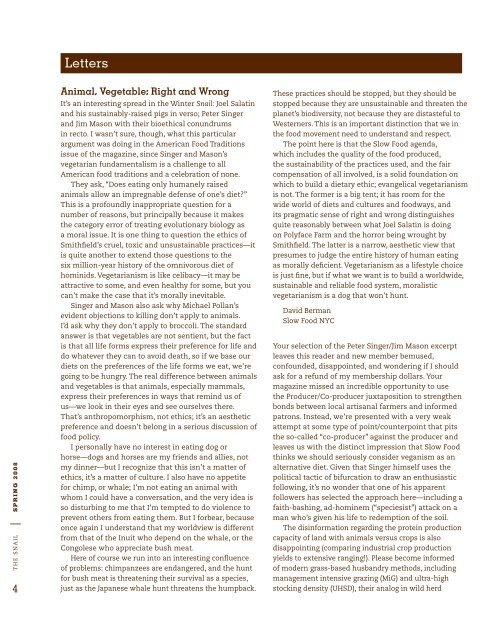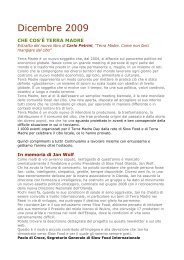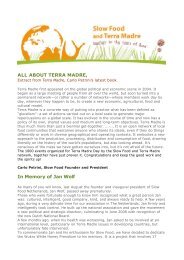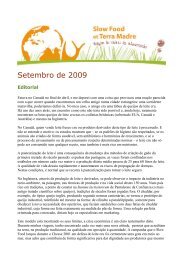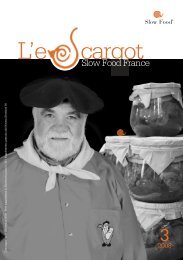all the food that's fit to print The Education Issue - Slow Food
all the food that's fit to print The Education Issue - Slow Food
all the food that's fit to print The Education Issue - Slow Food
Create successful ePaper yourself
Turn your PDF publications into a flip-book with our unique Google optimized e-Paper software.
Letters<br />
<strong>The</strong> snail | Spring 2008<br />
4<br />
Animal, Vegetable; Right and Wrong<br />
It’s an interesting spread in <strong>the</strong> Winter Snail: Joel Salatin<br />
and his sustainably-raised pigs in verso; Peter Singer<br />
and Jim Mason with <strong>the</strong>ir bioethical conundrums<br />
in rec<strong>to</strong>. I wasn’t sure, though, what this particular<br />
argument was doing in <strong>the</strong> American <strong>Food</strong> Traditions<br />
issue of <strong>the</strong> magazine, since Singer and Mason’s<br />
vegetarian fundamentalism is a ch<strong>all</strong>enge <strong>to</strong> <strong>all</strong><br />
American <strong>food</strong> traditions and a celebration of none.<br />
<strong>The</strong>y ask, “Does eating only humanely raised<br />
animals <strong>all</strong>ow an impregnable defense of one’s diet?”<br />
This is a profoundly inappropriate question for a<br />
number of reasons, but princip<strong>all</strong>y because it makes<br />
<strong>the</strong> category error of treating evolutionary biology as<br />
a moral issue. It is one thing <strong>to</strong> question <strong>the</strong> ethics of<br />
Smithfield’s cruel, <strong>to</strong>xic and unsustainable practices—it<br />
is quite ano<strong>the</strong>r <strong>to</strong> extend those questions <strong>to</strong> <strong>the</strong><br />
six million-year his<strong>to</strong>ry of <strong>the</strong> omnivorous diet of<br />
hominids. Vegetarianism is like celibacy—it may be<br />
attractive <strong>to</strong> some, and even healthy for some, but you<br />
can’t make <strong>the</strong> case that it’s mor<strong>all</strong>y inevitable.<br />
Singer and Mason also ask why Michael Pollan’s<br />
evident objections <strong>to</strong> killing don’t apply <strong>to</strong> animals.<br />
I’d ask why <strong>the</strong>y don’t apply <strong>to</strong> broccoli. <strong>The</strong> standard<br />
answer is that vegetables are not sentient, but <strong>the</strong> fact<br />
is that <strong>all</strong> life forms express <strong>the</strong>ir preference for life and<br />
do whatever <strong>the</strong>y can <strong>to</strong> avoid death, so if we base our<br />
diets on <strong>the</strong> preferences of <strong>the</strong> life forms we eat, we’re<br />
going <strong>to</strong> be hungry. <strong>The</strong> real difference between animals<br />
and vegetables is that animals, especi<strong>all</strong>y mammals,<br />
express <strong>the</strong>ir preferences in ways that remind us of<br />
us—we look in <strong>the</strong>ir eyes and see ourselves <strong>the</strong>re.<br />
That’s anthropomorphism, not ethics; it’s an aes<strong>the</strong>tic<br />
preference and doesn’t belong in a serious discussion of<br />
<strong>food</strong> policy.<br />
I person<strong>all</strong>y have no interest in eating dog or<br />
horse—dogs and horses are my friends and <strong>all</strong>ies, not<br />
my dinner—but I recognize that this isn’t a matter of<br />
ethics, it’s a matter of culture. I also have no appetite<br />
for chimp, or whale; I’m not eating an animal with<br />
whom I could have a conversation, and <strong>the</strong> very idea is<br />
so disturbing <strong>to</strong> me that I’m tempted <strong>to</strong> do violence <strong>to</strong><br />
prevent o<strong>the</strong>rs from eating <strong>the</strong>m. But I forbear, because<br />
once again I understand that my worldview is different<br />
from that of <strong>the</strong> Inuit who depend on <strong>the</strong> whale, or <strong>the</strong><br />
Congolese who appreciate bush meat.<br />
Here of course we run in<strong>to</strong> an interesting confluence<br />
of problems: chimpanzees are endangered, and <strong>the</strong> hunt<br />
for bush meat is threatening <strong>the</strong>ir survival as a species,<br />
just as <strong>the</strong> Japanese whale hunt threatens <strong>the</strong> humpback.<br />
<strong>The</strong>se practices should be s<strong>to</strong>pped, but <strong>the</strong>y should be<br />
s<strong>to</strong>pped because <strong>the</strong>y are unsustainable and threaten <strong>the</strong><br />
planet’s biodiversity, not because <strong>the</strong>y are distasteful <strong>to</strong><br />
Westerners. This is an important distinction that we in<br />
<strong>the</strong> <strong>food</strong> movement need <strong>to</strong> understand and respect.<br />
<strong>The</strong> point here is that <strong>the</strong> <strong>Slow</strong> <strong>Food</strong> agenda,<br />
which includes <strong>the</strong> quality of <strong>the</strong> <strong>food</strong> produced,<br />
<strong>the</strong> sustainability of <strong>the</strong> practices used, and <strong>the</strong> fair<br />
compensation of <strong>all</strong> involved, is a solid foundation on<br />
which <strong>to</strong> build a dietary ethic; evangelical vegetarianism<br />
is not. <strong>The</strong> former is a big tent; it has room for <strong>the</strong><br />
wide world of diets and cultures and <strong>food</strong>ways, and<br />
its pragmatic sense of right and wrong distinguishes<br />
quite reasonably between what Joel Salatin is doing<br />
on Polyface Farm and <strong>the</strong> horror being wrought by<br />
Smithfield. <strong>The</strong> latter is a narrow, aes<strong>the</strong>tic view that<br />
presumes <strong>to</strong> judge <strong>the</strong> entire his<strong>to</strong>ry of human eating<br />
as mor<strong>all</strong>y deficient. Vegetarianism as a lifestyle choice<br />
is just fine, but if what we want is <strong>to</strong> build a worldwide,<br />
sustainable and reliable <strong>food</strong> system, moralistic<br />
vegetarianism is a dog that won’t hunt.<br />
David Berman<br />
<strong>Slow</strong> <strong>Food</strong> NYC<br />
Your selection of <strong>the</strong> Peter Singer/Jim Mason excerpt<br />
leaves this reader and new member bemused,<br />
confounded, disappointed, and wondering if I should<br />
ask for a refund of my membership dollars. Your<br />
magazine missed an incredible opportunity <strong>to</strong> use<br />
<strong>the</strong> Producer/Co-producer juxtaposition <strong>to</strong> streng<strong>the</strong>n<br />
bonds between local artisanal farmers and informed<br />
patrons. Instead, we’re presented with a very weak<br />
attempt at some type of point/counterpoint that pits<br />
<strong>the</strong> so-c<strong>all</strong>ed “co-producer” against <strong>the</strong> producer and<br />
leaves us with <strong>the</strong> distinct impression that <strong>Slow</strong> <strong>Food</strong><br />
thinks we should seriously consider veganism as an<br />
alternative diet. Given that Singer himself uses <strong>the</strong><br />
political tactic of bifurcation <strong>to</strong> draw an enthusiastic<br />
following, it’s no wonder that one of his apparent<br />
followers has selected <strong>the</strong> approach here—including a<br />
faith-bashing, ad-hominem (“speciesist”) attack on a<br />
man who’s given his life <strong>to</strong> redemption of <strong>the</strong> soil.<br />
<strong>The</strong> disinformation regarding <strong>the</strong> protein production<br />
capacity of land with animals versus crops is also<br />
disappointing (comparing industrial crop production<br />
yields <strong>to</strong> extensive ranging!). Please become informed<br />
of modern grass-based husbandry methods, including<br />
management intensive grazing (MiG) and ultra-high<br />
s<strong>to</strong>cking density (UHSD), <strong>the</strong>ir analog in wild herd


